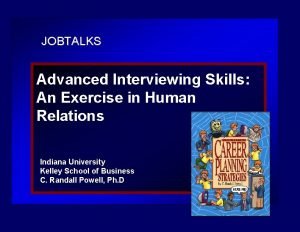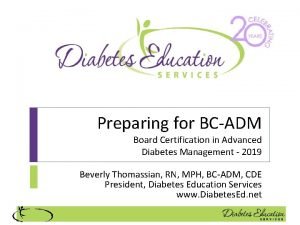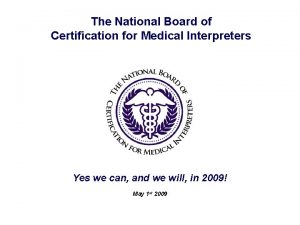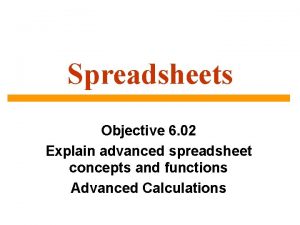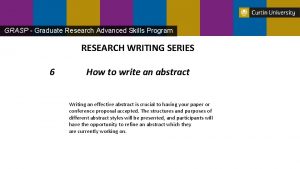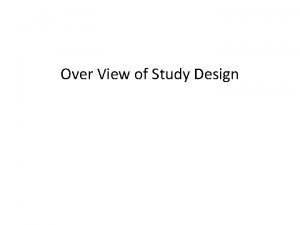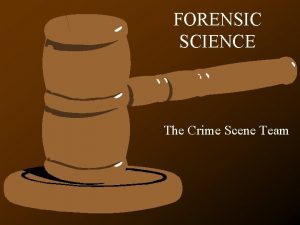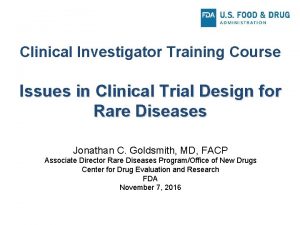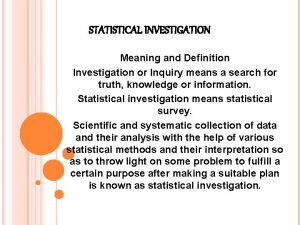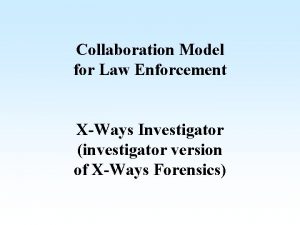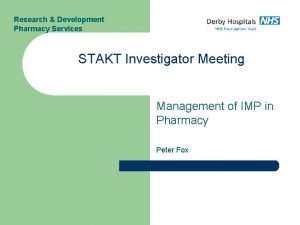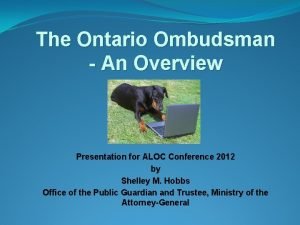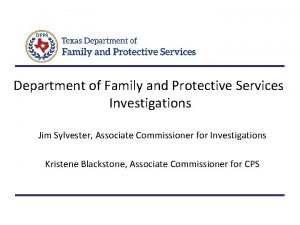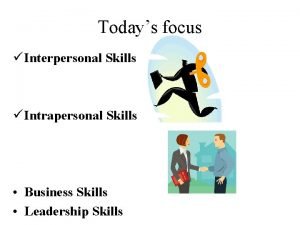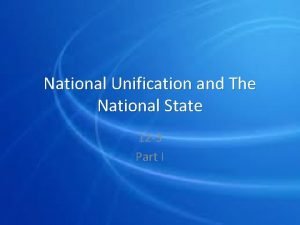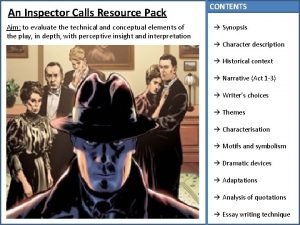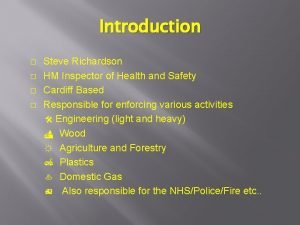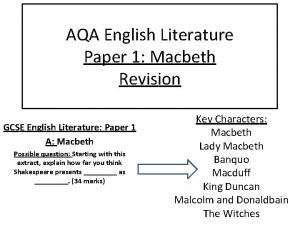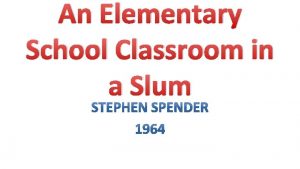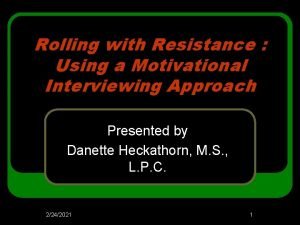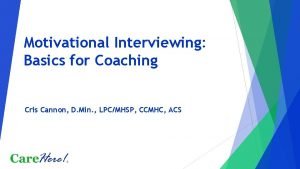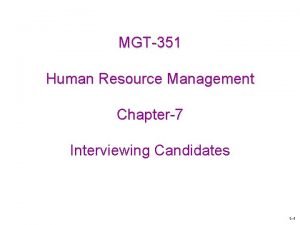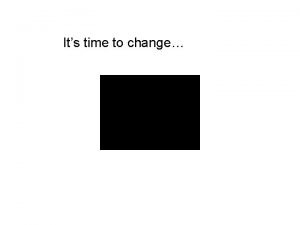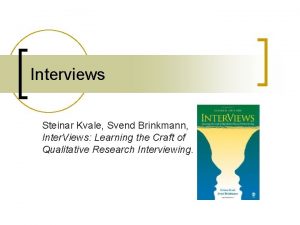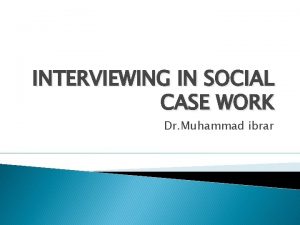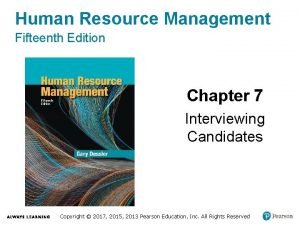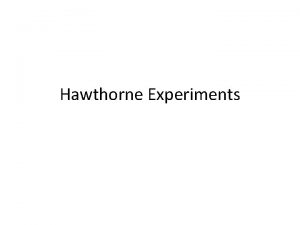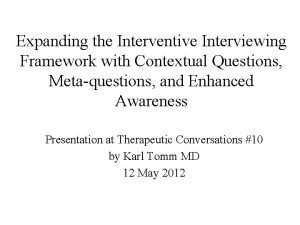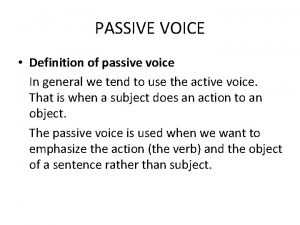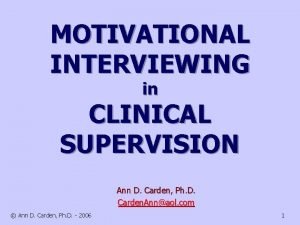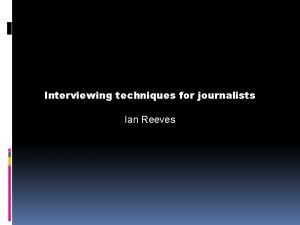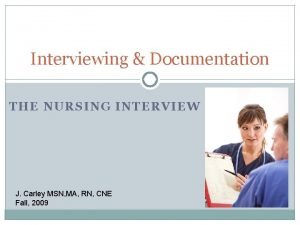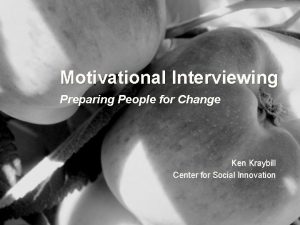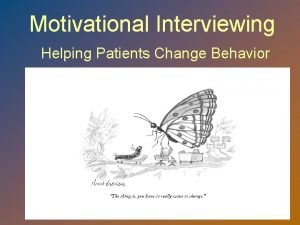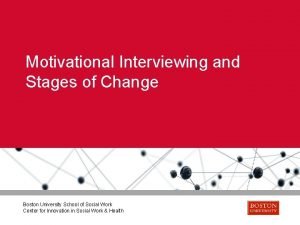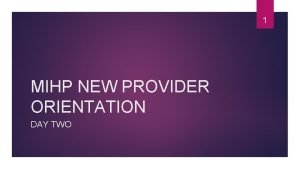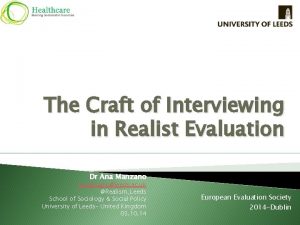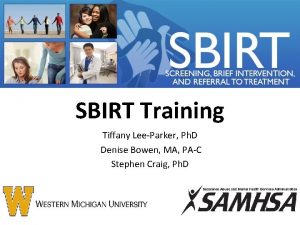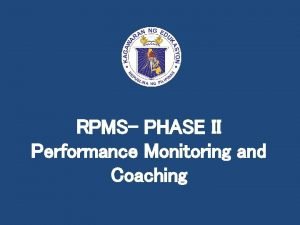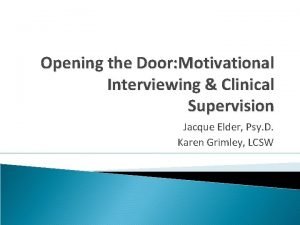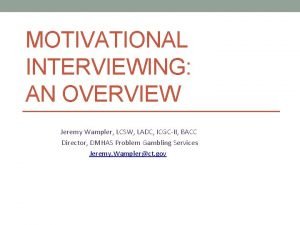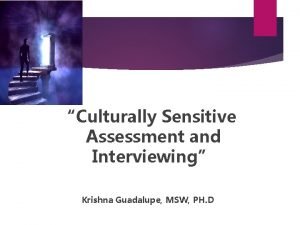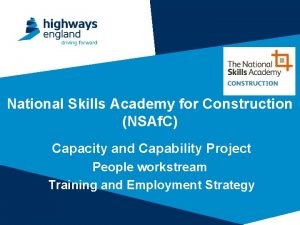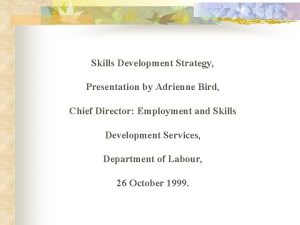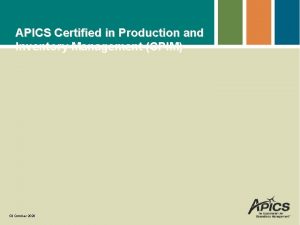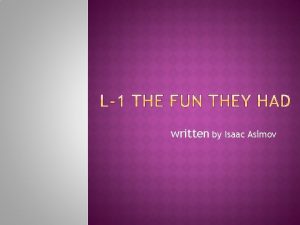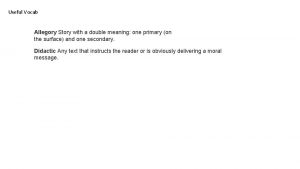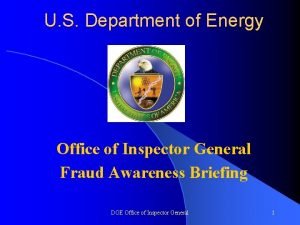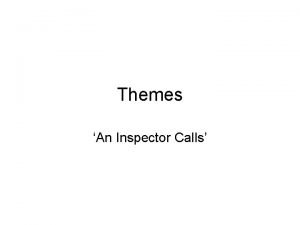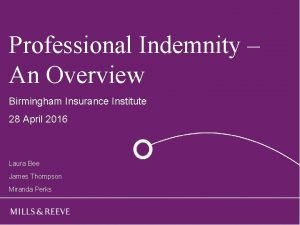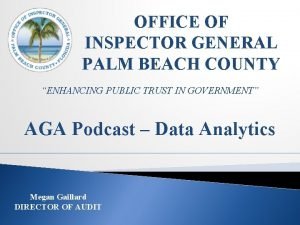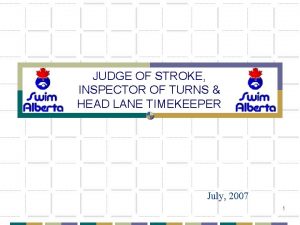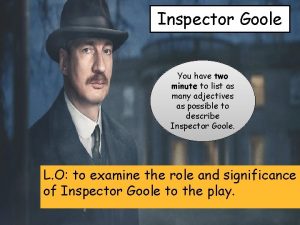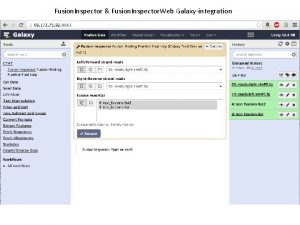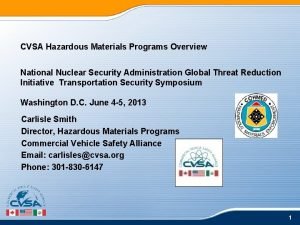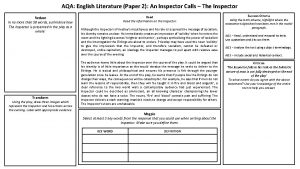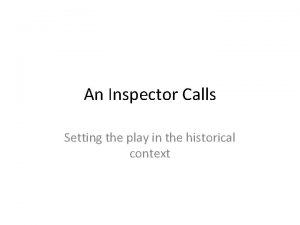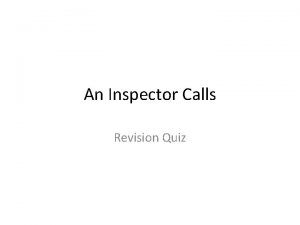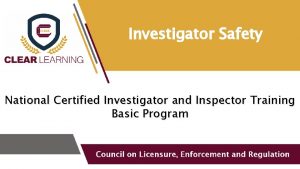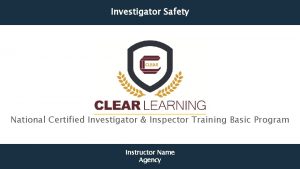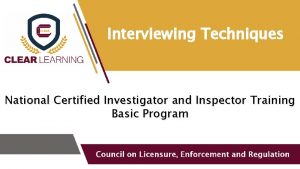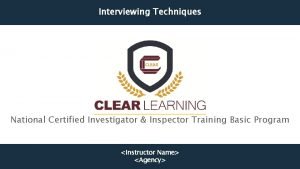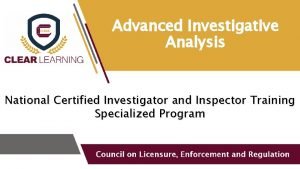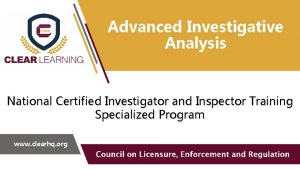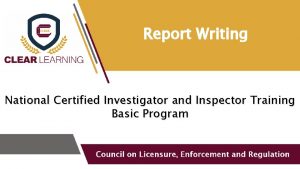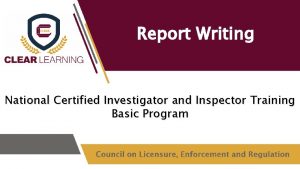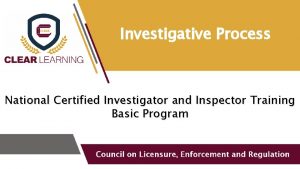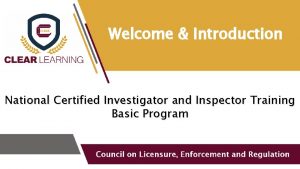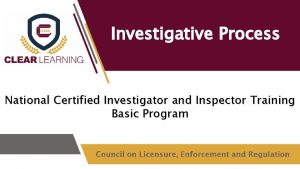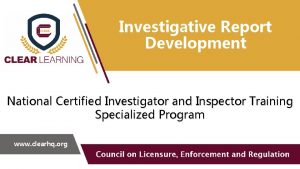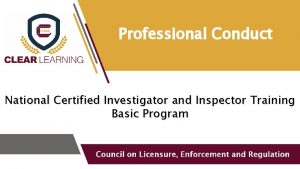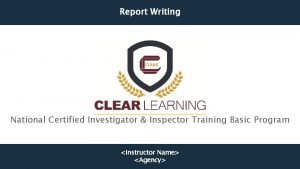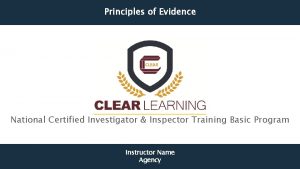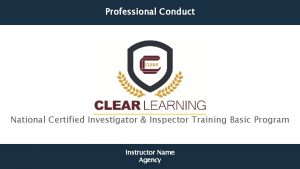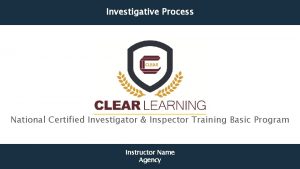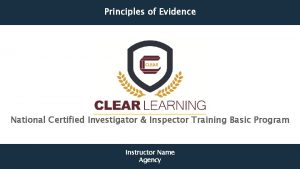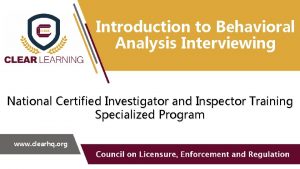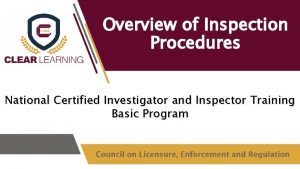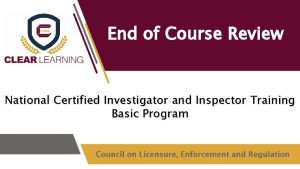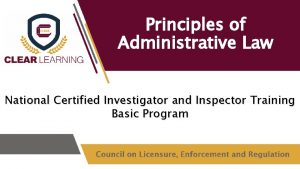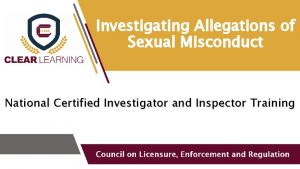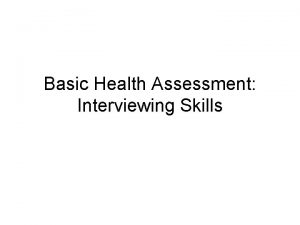Advanced Interviewing Skills National Certified Investigator and Inspector









































































































- Slides: 105

Advanced Interviewing Skills National Certified Investigator and Inspector Training Specialized Program

Session Introduction

Upon completion of the session, you will be able to: Learning Objectives § List main goals of memory recall interview § Describe main functions of right & left sides of brain § Demonstrate use of 4 -step memory recall technique

Session Map Advanced Interviewing Skills Memory Recall Introduction to Behavioral Analysis Interviewing Behavioral Questioning and Demonstration

Memory Recall

Purpose of Memory Recall Technique A technique that will assist an interviewee in recalling past events May be very time consuming!

Foundation of Memory Recall Technique Based on FBI Behavioral Sciences Research Data Like hypnosis without a trance Easy to use

Main Goal of Memory Recall Technique To reconstruct the physical and psychological environment of the original event with the event keyed to the feelings of the subject

Remember Not an interrogation Interviewee must be willing Not just looking for the facts

The Memory Process

Perception is different for each individual Cognitive memory recall helps the memory link what we see to the past and the present. Synapses in the brain are gates that open and close. Our goal is to open them as much as possible and attempt to keep them open!

Left Vs. Right Brain

Left Brain Spoken and written language § Sequencing § Word analysis § Filling out forms § Numbers § Letters Analytical Logical Abstract Thinks in the past and future

Right Brain Nonverbal information Drawing Construction Voice Tones Creative Intuitive Spatial Relationships Concrete Thinks in the present

Factors that Affect Memory Time Stress Perception Distortion Recall Technique Our links are lost if we don’t use them enough What was your locker number in high school?

Factors that Affect Memory Time Stress Perception Distortion Recall Technique Everything in the body is affected by stress Our bodies respond to the influence of stress in positive and negative ways Positive: Fight or Flight Negative: Ulcers, headaches, frazzled nerves Stress can block memory

Factors that Affect Memory Time Stress Perception Distortion Recall Technique Unique to everyone Different people can look at the same event and interpret it differently depending on: § Presence or lack of threat to personal safety § Emotions or frame of mind at time of event

Factors that Affect Memory Time Stress Perception Distortion Recall Technique Preconceived notions External input

Factors that Affect Memory Time Stress Perception Distortion Recall Technique Instructions are important Include as many types of sensory recollections as possible Ask interviewee to think about the event (mental picture)

Memory Recall Interview Process

Interview Setting Quiet Private Establish rapport Relax The only part controlled by the interviewer

Memory Recall Steps Reconstruct the Circumstances Report Everything Recall events in Different Order Change Perspectives Have the subject try to reconstruct the circumstances that surrounded the event Ask them to think about what the environment looked like Ask them to think about how they were feeling at the time of the event, focusing on the emotions

Memory Recall Steps Reconstruct the Circumstances § This is called editing § Stay alert and encourage the subject to refrain from editing Report Everything Recall events in Different Order Change Perspectives People will naturally hold back information or decide not to talk about something Nothing is Unimportant This concept is contradictory to the standard interview paradigm of just the facts

Memory Recall Steps Reconstruct the Circumstances It’s natural to use chronological order when describing events Ask subject to: § Go through events in reverse order § Start with what impressed them most and go from there Report Everything Recall events in Different Order Change Perspectives Not done to confuse Allows the subject to focus on the details

Memory Recall Steps Reconstruct the Circumstances Report Everything Recall events in Different Order Change Perspectives Ask the subject to try and describe the event from the perspective of another person We do not really expect them to be able to tell what another person may have seen This is another way to get the subject to focus on the event in detail

Memory Recall Steps Reconstruct the Circumstances Report Everything Recall events in Different Order Change Perspectives What do you suppose the other witnesses saw? What would the janitor, security guard, and/or ward secretary have seen? These types of questions force the subject to think hard about the environment and events

Post Interview Considerations Don’t interrupt when the subject is telling the story! At the conclusion, pause to make certain they are finished At the conclusion, let them know that other details may come to them and give them a way to get in touch with you at a later date

Keys to Success Establish Rapport and Calm the Subject This is not an adversarial relationship Sell what you are doing § They must believe you and have confidence in you Conduct Interview is Safe, Quiet Setting Use all Memory Recall Steps in Order Assist subject in Developing Mental Picture of Incident

Keys to Success Establish Rapport and Calm the Subject Conduct Interview is Safe, Quiet Setting Use all Memory Recall Steps in Order Assist subject in Developing Mental Picture of Incident This is the only part of the interviewer controls No distractions § Cell phones § People § Smells

Keys to Success Establish Rapport and Calm the Subject Conduct Interview is Safe, Quiet Setting Use all Memory Recall Steps in Order Assist subject in Developing Mental Picture of Incident Research indicates that you will get more detailed information if you use the steps of memory recall in their proper order.

Keys to Success Establish Rapport and Calm the Subject Conduct Interview is Safe, Quiet Setting Use all Memory Recall Steps in Order Assist subject in Developing Mental Picture of Incident Ask them to think about sounds, smells, feelings § Suggest closing their eyes to focus on other sense memories Speak softly to help subject relax Use silence appropriately Maintain a comfortable amount of eye contact

Reminders for Interviewing Success Focus on the subject’s needs Their feelings come before your facts Ask the subject to verbalize everything that comes to their mind Only use open ended questions Do not inject yourself into their story

Memory Recall Exercise Break into groups § Interviewer § Subject Use all four steps of the memory recall process Use open-ended questions Once complete, switch roles

Introduction to Behavioral Analysis Interviewing

Three Aspects of General Interviewing Contact actions Filter factors Pre-contact preparation

Filter Factors of the Interviewer Use non-judgmental acceptance Continue to build and maintain rapport Use empathy and respect Use active listening Be patient Contact actions Filter factors Pre-contact preparation

Filter Factors of the Interviewer Use positive eye contact Keep a neutral, open stance Control personal emotions and values Constantly use observation and assessment skills Contact actions Filter factors Pre-contact preparation

Filter Factors for the Interviewer Avoid third degree questioning technique Use simple questions Assume more information is available Contact actions Filter factors Pre-contact preparation

Pre-Contact Preparation Study the file, and develop a flexible interview structure Have a clear understanding of the interview objective, specifically the violation or infraction Consider the subject’s personality regarding habits and interests Contact actions Filter factors Pre-contact preparation

Pre-Contact Preparation Review all available evidence to focus the interview Consider motivation Check for recent or serial emotional triggering events Remember: The motivation to commit an illegal or improper action will usually involve an emotional value Contact actions Filter factors Pre-contact preparation

Contact Actions Greeting Seating Begin behavioral analysis baseline development of the subject Contact actions Filter factors Pre-contact preparation

Benefits of Behavioral Analysis Assists in questioning during an interview. If non-verbal does not agree with verbal communication, you should ask yourself “why? ” Allows interviewer to know when rapport is established, stress is occurring, or an admission may be forthcoming Helps analyze the subject’s response to questions about case facts

Interviewer Self-Awareness It is imperative that we do not make decisions about a subject’s behavior when we are the cause of it Be aware of cultural differences Develop rapport with the individual at every interview

Baseline Development Begin on initial contact with subject Continue to develop and refine assessments to normal circumstances Pay attention to verbal responses Pay attention to non-verbal behaviors Use as a guide to assess changes when correlated with a specific question

Non-Verbal Communication More reliable than verbal communication Meaning behind words changes, or is supported, or contradicted by physical behavior Responsible for more than half of total communication Behavior symptoms become MORE revealing as anxiety increases

A Note on Approach Interrogation is just not simply talking to people and ultimately they confess. Research has shown that the interrogator's tactics and style has a direct effect on the outcome of the interrogation. An accusatory style results in less information, diminished cooperation, a greatly reduced number of cues Stan B. Walters 8 -30 -07 “Working in the Room” from The Interview Room August 07

Attitudes Normal Composed Sincere Spontaneous Direct Stress-Induced Overly anxious Defensive Excessively polite Flattering Flirtatious Evasive

Body Postures Normal Upright Frontal alignment Forward Attentive Relaxed Casual Stress-Induced Slouched Rigid Immobile Jerking movements Turned sideways/away Startle response

Gross Body Movements Normal Hand movements opening and away from the body Open gesturing Stress-Induced Hand movements towards body during hot questioning Move away Move chair Need to leave the room Exaggerated movement

Grooming Gestures Normal Nothing unduly noticeable Stress-Induced Brushing hair Picking lint from clothes Covering mouth or eyes Checking fingernails Adjusting clothes Checking watch Retying shoes

Eye Contact Normal 30% - 60% once rapport is established Stress-Induced Minimal contact, Difficulty in making contact Eyes break away on hot questions 1000 yard stare

Eye Contact A stressed subject has trouble sustaining normal eye contact Eye movement to ceiling or walls indicates stress associated with latest question asked Eye movement to the floor may indicate resignation Don’t stare or engage in staring contest Dark glasses should be removed if possible

Self-Initiated Spontaneous Verbal Behaviors People experiencing stress tend to display more self-initiated, spontaneous verbal behaviors § i. e. , answering before the complete question is asked The fewer spontaneous responses, the more likely it is that the person is not stressed on that particular point

Speech Patterns Indicating Stress induces changes in rate, volume, etc. Tone may change and vary between overtly angry or growling answers, to whispering Establish baseline in rapport building and constantly assess for changes

Additional Verbal Stress Indicators Over-friendly or excessively respectful Flirting How the word No is used § Inappropriately § Sing-song or repetitive § Finger Pointing Non responses § Evading or repeating the question, or asking you to repeat the question

Additional Verbal Stress Indicators Environmental Complaints: § Room temperature § Headache, upset stomach § Chair is too hard

Additional Verbal Stress Indicators Use of “con” phrases: § Why would I do that? § They said something happened, I don’t know. § Why would anyone do that? § It’s probably an error. 90% of the time a con phrase will precede a false statement

Behavioral Questioning and Demonstration

Principles of Behavior Analysis Questioning This is not a polygraph, findings individually mean nothing Assess the baseline behavior for changes in response to questions Identify areas for further examination Must be taken in context and repeated to be valid indicators

Behavioral Analysis Questioning Analyzes emotional and/or physical responses to opinion or attitude questions § These questions are sensitive because they involve the subject who is being questioned § They trigger certain physiological responses more so than simple fact questions Use 10 -12 behavioral questions to get an accurate assessment

Sample Questions

Do you know why I have asked you to come here today? Normal Response § Will offer some reasonable understanding of the event or investigation Stressed Response § I have no idea why I am here.

“As you know, I am investigating. If you were involved I want you to tell me anything you know about it now. ” Normal Response § I was not involved and I have nothing to tell you. § They will help move the investigation along and will usually offer information that can be verified easily. Stressed Response § Rationalizing statements to show their innocence § Deny knowledge § Reduce specificity § Widen the scope of the investigation § Will not offer easily verifiable information

Understanding that you may be wrong, and that I will keep this confidential, who do you think may have committed this act? Normal Response § May provide a name and a reason that is verifiable § If can’t give a name, usually offer a plausible reason Stressed Response § Don’t know § May engage in character assassination with no verification § May name people but be unable to offer logical reason why

Who can vouch for you, and tell me that they know for certain you did not commit this violation? Normal Response § Will provide a name § Will provide accurate, verifiable information on: § How to contact the person named § The relationship that exists Stressed Response § Either won’t provide name, or only general identity § They may give excuses § Nobody likes me § I don’t really know anyone that well § I keep to myself and don’t socialize at work

Do you think this violation really happened? Normal Response § Yes, or you wouldn’t be here. Stressed Response § Maybe not § This is a bunch of bull § This company keeps lousy records § It’s an accounting error

(How, when, or where) do you think this violation happened? Normal Response § May offer no opinion with a reason § I wasn’t at work that day § May offer approximate or specific information that can be verified Stressed Response § Will provide a response with the widest possible parameters § Anyone could have done it at anytime, from anywhere

Do you think the person who did this works for this company? Normal Response § Yes or no § Will have verifiable reasons or information to support answer Stressed Response § Will have no idea § It could be anyone, likely someone from the outside § Will have no basis for the answer provided

Who would have had the best opportunity to commit such a violation if desired? Normal Response § Anyone with access § Even if that includes the subject Stressed Response § Anyone, Everyone § May try to push suspicion away from themselves.

Why do you think someone would commit this violation? Normal Response § Provides rational explanation § Financial gain § Habit Stressed Response § Suggest that the person needs help, or has a problem § Attempt to induce sympathy

Normal Response § I didn’t do it Tell me why you wouldn’t commit this violation. Stressed Response § I wasn’t raised that way § It’s not me § I would never think of doing something like that § Anything other than a definitive rejection of the proposal

What do you think should happen to the person who committed this violation? Normal Response § Will recommend a punishment suitable to the violation Stressed Response § Either overstate § Hang ‘em § Or psychoanalyze § They are probably sick or troubled and need help

Do you think there is any reason the person who did this should be given any special consideration? Normal Response § No § They should be handled like anyone else Stressed Response § Yes § Perhaps a stern warning or probation would teach them a lesson

How do you feel towards the person who committed this violation? Normal Response § They will state exactly how they feel about the person Stressed Response § They will be sympathetic and offer rationalizations for the behavior

Did you tell anyone about our interview today? What did you talk about? Normal Response § Yes § Will describe the discussion Stressed Response § No § It isn’t anyone else’s business

On a scale from 1 -10, 1 being the lowest and 10 the highest, how do you rate working here? Normal Response § General approval rates 6 -10 Stressed Response § 5 or less § They feel like the victim

If the organization could pay restitution to resolve this complaint, would you contribute to help pay damages? Normal Response § No way Stressed Response § Would consider it

Session Review

Two Reasons to Use Behavioral Analysis Questioning To focus the investigation where there are multiple suspects (time management) 2. Use after a traditional interview to test the first statement 1.

Use Behavioral Analysis to Categorize Suspects Normal § Verbal and non-verbal signals are normal Stress induced § Verbal and non-verbal signals are stress induced Mixed § Verbal signals seem to be normal, but non-verbal signals contain indicators of stress induced responses

Has Normal Responses an opinion and will discuss Won’t condemn company or the investigation In favor of punishment Will identify verifiable suspect or help narrow the investigation Never consider personal payment of restitution

Doesn’t Stress Induced Responses know anything, or has a broad opinion Blames or condemns the company and/or the investigator In favor of leniency Will eliminate themselves as a suspect or broaden the investigation Willing to consider personal payment of restitution

Two Reasons for Mixed Readings Subject is innocent but knows something about the violation Subject did not commit this violation, but may have been involved in a previous incident

Knowledge Check A. B. Which of the following is one of the four steps of memory recall? C. D. E. Report everything Reconstruct the circumstances Change perspectives Recall events in different order All of the above

Knowledge Check Which of the following was NOT one of the factors that affect memory discussed in class? A. B. C. D. E. Time Stress Perception Interference Distortion

Knowledge Check A. A variation of “Tell me what you saw/heard/felt that day” would be an effective memory recall question because? B. C. Distracts the subject from other details Provides more detail for the interviewer Invokes subject’s senses, leading to a more complete picture Can help subject avoid pain related to memory

Knowledge Check The natural tendency to hold information back or not talk during an interview is known as: A. B. C. D. The silent treatment Editing Stonewalling The Fifth Amendment

Knowledge Check A. B. It is important to ask questions that integrate the subject’s left and right sides of the brain because: C. D. Each side doesn’t store memories individually Memories stored in the right are forgotten easily Integrating factual and emotional elements in memories leads to better recall One side can take over if bad reaction to memory in other

Knowledge Check A. B. Why is it important to use the four steps of memory recall in their proper order? C. D. You will get more detailed information You will be less likely to confuse subject It is easier to conduct the interview in the listed order Subject will forget earlier questions and be more likely to share information later in interview

Knowledge Check Which of the following attitudes could indicate stress induced responses? A. B. C. D. Sincere Spontaneous Direct Excessively polite

Knowledge Check A. Too little eye contact (i. e. less than 30%) can indicate stress, but so can: B. C. D. Constant eye contact Eye movements to the ceiling and walls Attempted staring contests All of the above

Knowledge Check A. Why is it important to establish a baseline in the rapport stage of a behavioral analysis interview? B. C. D. To make the subject feel comfortable To be able to recognize deviations from normal behavior that may indicate stress induced behaviors To ensure the subject provides all the information he or she has on the issue All of the above

Knowledge Check What is the most likely, normal response to the question: Do you know why you are here today? A. B. C. D. I have no idea why I’m here To ask me about… To waste my time and take me away from my duties Silence or no response

Knowledge Check A. When asked specific questions about the time, place, or parties surrounding an event, a person experiencing stress is most likely to: B. C. Give a response with the widest possible parameters to broaden the potential explanations Provide a response that indicates no opinion on the matter, supported by a reason Offer verifiable and specific information

Knowledge Check A. Behavioral analysis questions can be used to categorize suspects as: B. C. D. Normal, verbal and nonverbal are normal Stress induced, verbal and non-verbal are stress induced Mixed, verbal seems normal but non-verbal has indicators of stress All of the above

Knowledge Check A. All of the following verbal responses are indicative of stress induced behaviors except: B. C. D. Repeating the question Complaining about the room temperature Giving brief, specific responses Using a “con” phrase like “Why would I do that? ”

Knowledge Check To get an accurate assessment during behavioral analysis questioning, the interviewer should use 10 to behavioral questions. A. B. C. D. 15 11 12 20

You Learning Objectives Review should now be able to: § List main goal of memory recall interview § Describe main functions of right & left sides of brain § Demonstrate use of 4 -step memory recall technique

Questions ?

Session Evaluation

In general, this instructor: A. B. C. D. E. Is Unacceptable Needs Improvement Is Good Is Very Good Is Excellent

The style of delivery: A. B. C. D. E. Is Unacceptable Needs Improvement Is Good Is Very Good Is Excellent

The content: A. B. C. D. E. Is Unacceptable Needs Improvement Is Good Is Very Good Is Excellent

The amount of material covered: A. B. C. D. E. Is Unacceptable Needs Improvement Is Good Is Very Good Is Excellent

The usefulness of this session: A. B. C. D. E. Is Unacceptable Needs Improvement Is Good Is Very Good Is Excellent
 Advanced interviewing techniques
Advanced interviewing techniques Bcadm
Bcadm National board of certification for medical interpreters
National board of certification for medical interpreters Child family investigator
Child family investigator Less than sign
Less than sign Edunet south africa
Edunet south africa How to write an abstract example
How to write an abstract example Shared investigator platform home
Shared investigator platform home Did investigator assign exposures
Did investigator assign exposures Rough sketch vs final sketch crime scene
Rough sketch vs final sketch crime scene Diversion investigator
Diversion investigator Craigslist wayne
Craigslist wayne Cps special investigator
Cps special investigator Fda clinical investigator training course
Fda clinical investigator training course Bio-rad
Bio-rad Definition for investigation
Definition for investigation Early stage investigator nih
Early stage investigator nih X ways investigator
X ways investigator Userra vets investigator
Userra vets investigator Investigator meeting services
Investigator meeting services Invasive species investigator worksheet
Invasive species investigator worksheet Social media forensics investigator
Social media forensics investigator Invasive species investigator worksheet
Invasive species investigator worksheet Investigator responsibilities gcp
Investigator responsibilities gcp John marler fda
John marler fda Gmo investigator kit
Gmo investigator kit Investigator photos
Investigator photos Ontario ombudsman investigator
Ontario ombudsman investigator Swf investigator
Swf investigator Ba mid career fellowship
Ba mid career fellowship Chin interactive investigator
Chin interactive investigator Office of the correctional investigator
Office of the correctional investigator Dfps special investigator
Dfps special investigator Interpersonal skills vs intrapersonal skills
Interpersonal skills vs intrapersonal skills Skills.
Skills. National unification and the national state
National unification and the national state Nc license and theft bureau offices
Nc license and theft bureau offices Socialism and capitalism in an inspector calls bbc bitesize
Socialism and capitalism in an inspector calls bbc bitesize Hm inspector of health and safety
Hm inspector of health and safety English literature paper 1 macbeth and inspector calls
English literature paper 1 macbeth and inspector calls An elementary school classroom in a slum analysis
An elementary school classroom in a slum analysis Skills passport
Skills passport What does rolling with resistance mean
What does rolling with resistance mean Contoh motivational interviewing
Contoh motivational interviewing Dears motivational interviewing
Dears motivational interviewing Motivational interviewing schizophrenia
Motivational interviewing schizophrenia Cris cannon
Cris cannon Dears motivational interviewing
Dears motivational interviewing Chapter 7 interviewing candidates
Chapter 7 interviewing candidates Preparatory change talk examples
Preparatory change talk examples Nimi singh
Nimi singh Kvale seven stages of interviewing
Kvale seven stages of interviewing Components of social case work pdf
Components of social case work pdf Interviewing in action in a multicultural world
Interviewing in action in a multicultural world Chapter 7 interviewing candidates
Chapter 7 interviewing candidates Relay room experiment
Relay room experiment Interventive questions
Interventive questions Motivational interviewing case management
Motivational interviewing case management Passive voice meaning
Passive voice meaning Motivational interviewing
Motivational interviewing Interviewing techniques journalism
Interviewing techniques journalism Performance based interview
Performance based interview Ten traps of interviewing
Ten traps of interviewing Interviewing techniques definition
Interviewing techniques definition Decisional balance
Decisional balance Agreement with a twist motivational interviewing
Agreement with a twist motivational interviewing Readiness ruler motivational interviewing
Readiness ruler motivational interviewing Motivational interviewing
Motivational interviewing Darn cats motivational interviewing
Darn cats motivational interviewing Dares motivational interviewing
Dares motivational interviewing Active listening motivational interviewing
Active listening motivational interviewing Darn cat motivational interviewing
Darn cat motivational interviewing Motivational interviewing
Motivational interviewing Agreement with a twist motivational interviewing
Agreement with a twist motivational interviewing Reds motivational interviewing
Reds motivational interviewing The craft of interviewing in realist evaluation
The craft of interviewing in realist evaluation Darn cat motivational interviewing
Darn cat motivational interviewing Star framework
Star framework Motivational interviewing
Motivational interviewing Darn cat motivational interviewing
Darn cat motivational interviewing Change talk worksheet
Change talk worksheet Motivational interviewing traps
Motivational interviewing traps Intensive interviewing
Intensive interviewing Interventive interviewing
Interventive interviewing Krishna guadalupe
Krishna guadalupe National skills academy for retail
National skills academy for retail National skills strategy 2025
National skills strategy 2025 Adrienne bird
Adrienne bird Apics inventory management
Apics inventory management Cmrp exam passing score
Cmrp exam passing score Characteristics of margie
Characteristics of margie Is an inspector calls an allegory
Is an inspector calls an allegory Doe inspector general
Doe inspector general Themes in an inspector calls
Themes in an inspector calls Ofsted inspector professional indemnity insurance
Ofsted inspector professional indemnity insurance Audit data analytics
Audit data analytics Inspector of turns
Inspector of turns Adjectives to describe inspector goole
Adjectives to describe inspector goole Prestige trinity center
Prestige trinity center Inspector de propiedades
Inspector de propiedades Cvsa inspector certification
Cvsa inspector certification Worcester ma building dept
Worcester ma building dept Inspector calls characters
Inspector calls characters Inspector calls mark scheme
Inspector calls mark scheme 1912 strikes an inspector calls
1912 strikes an inspector calls Fairly easy manners
Fairly easy manners
